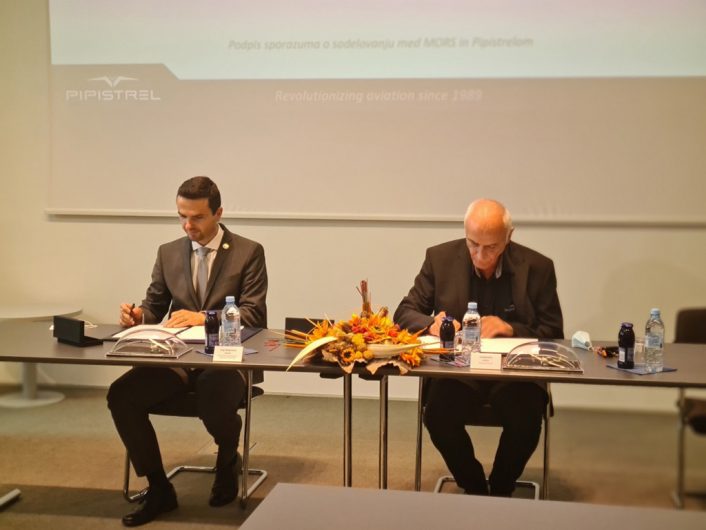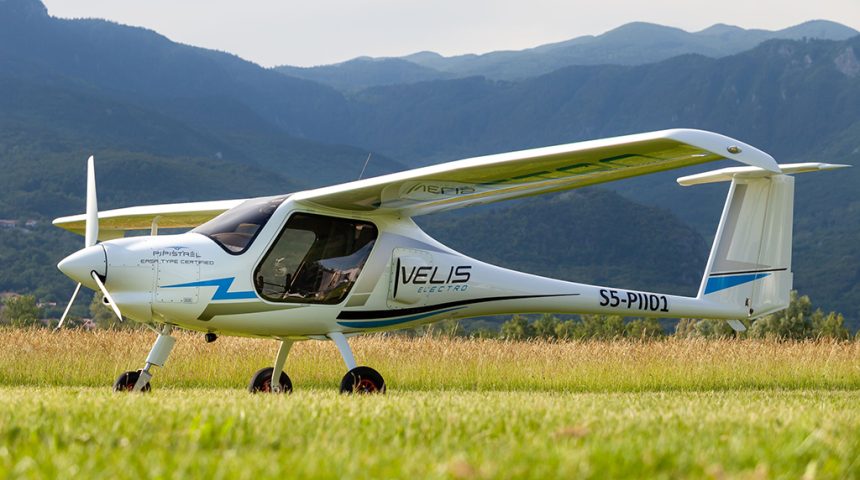Slovenian Army to test various Pipistrel basic trainers to select the one that will replace its Zlin 143 and 242 aircraft.
On June 29, 2021, the Minister of Defence of the Republic of Slovenia, Matej Tonin, visited Pipistrel‘s headquarter in Ajdovščina, Slovenia, and signed an agreement to test various Pipistrel made aircraft for basic training purposes. The Slovenian Army will test a Virus SW121, a Velis Electro, the four seater Panthera and the simulator Velis X-Alpha VR.
Pipistrel will also provide pilot familiarization and train army mechanics for prefight inspections and basic maintenance of the above mentioned planes. The MoD will in return enable Pipistrel the use of the Poček military range and the areas of the Cerklje ob Krki air base.
The Slovenian Army uses two Zlin 143 and eight Zlin 242 aircraft, that will be replaced in the next years, for basic training of the cadets. The evaluation of the aircraft will start soon, making Slovenia the first military operator of an all electric plane. The Danish MoD already signed a leasing contract for two Velis Electro earlier in June, but the deliveries are scheduled for September.

Tonin commented the agreement as a move into the direction of a »green« defence. The Velis Electro is the first type certified electric aircraft in the world, while the Rotax 912 S3 powered Virus SW121 uses less than 50% fuel of army’s Zlins. The army will evaluate also the four seater Panthera and after that will decide which type will replace the aging Zlin 143s and 242s.
The company and the MoD agreed also on a special partnership with the purpose of obtaining as much funding as possible from NATO and the European Union for development projects and already mentioned a study for a new system to contrast drones.
The Slovenian MoD is proud to cooperate with and support the national industry.
“By using such aircraft, the Slovenian Army has given a clear message to its allies within NATO and wider, that these are exceptionally high-quality aircraft which can be used also by other armed forces,” the Slovenian Minister said.

Ivo Boscarol, Pipistrel’s founder and CEO added: “In this area, Pipistrel has the upper hand, as we were the first in the world to certify an electric aircraft. The Slovenian Army will be the first to receive such an inaudible electric aircraft for primary schooling as a part of the program which also includes a faster two-seat aircraft, a four-seat aircraft and a flight simulator with virtual reality technology.”
The Technical Director of Pipistrel group, dr. Tine Tomažič, explained why Pipistrel’s training planes are so different and better that they are also used by large armies. He described their principle, being designed for flying with very little power, and illustrated it with an example that they use a quarter less power than a car to fly 200km per hour, so they are suitable for electrification. The opportunity he sees for aircraft such as Velis or the Virus SW 121 platform is the digitalization of air force pilot training. As combat moves towards the virtual realm and aircraft are increasingly equipped with information systems, this means that the pilots they will inevitably encounter the latest technology, so training with this type of technology helps to prepare them to be immediately ready for new challenges.
Pipistrel’s biggest single score in the defence market was the winning of a contract with the Indian MoD in 2015. The company delivered 194 Virus SW80 “Garuda” to the Indian Armed Forces.
Later in the afternoon the Slovenian Minister of Defence moved to C-Astral’s factory, a company that focuses on fixed-wing small Unmanned Aircraft Systems (UAS) and is part of the Japanese TerraDrone Corporation. C-Astral is also headquartered in Ajdovščina and is collaborating with Pipistrel in the development of the NUUVA V20 family of unmanned systems. The company was founded in 2007 and exported more than 400 drones to 70 countries. The entire fleet accumulated more than 120.000 flight hours. The tactical reconnaissance UAV Bramor was adopted also by the Italian Army, Bangladesh and Cyprus. The Slovenian Army is also successfully operating it, with the codename Belin. The Minister of Defence anticipated a modernisation program of Belin’s fleet and the possibility of a further acquisition of more UAV-s.









